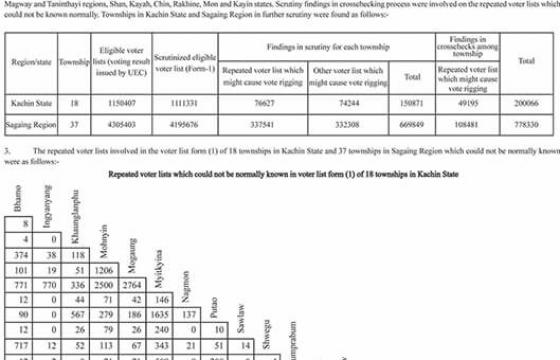Generally, the China-Myanmar Joint Press Release or Statement of 20 August 2016 is seen as a diplomatic procedure normally issued after the end of a country’s leaders visit.
But a closer look at it revealed a controversial issue that has been endorsed by the State Counsellor Aung San Suu Kyi, implying that Myanmar see eye-to-eye with China’s stance on Tibet, Xinjiang and Taiwan ownership without reservation. This sort of official political position, especially where Tibet and Xinjiang are concerned, has never been made public, safe for the “one China” policy that has been in place for several decades.
The paragraph regarding this was written: “Myanmar reiterated that it sticks to the One-China policy, understands and supports China’s stance on the Taiwan issue, Tibet-related issues and Xinjiang-related issues.”
While people readily are inclined to understand Suu Kyi’s political position to accommodate the big neighbouring country’s by bowing to the inclusion of this controversial phrase that says Myanmar endorsed the Chinese claims of undisputed ownership, from the moral and ethical point of view, it might be having a negative impact, specifically from the sovereignty and human rights violations facets.
Suu Kyi is admired for her staunch avocation of democracy and human rights, although she insisted that she is only a politician. But still forsaking universal human rights violations for only national interest that could tarnish, or even contradict, her steadfast, liberal democratic commitment might not be the way to go.
But before dwelling on this let us look at a bit more on the said controversial issue.
Tibet and Xinjiang
Quite a lot of people that this writer have known during the Unrepresented Nations and Peoples Organization (UNPO) days as a Shan representative were openly quite disappointed, particularly those from Tibet and Xinjiang, also known as East Turkestan.
It is not a wonder that the feeling of being hurt and betrayed were unable to be suppressed, especially when it was coming from a person they deeply considered to be their own kind, ideologically and world outlook.
But let us look at a bit more on this politically and internationally charged Tibet issue that refuses to fade away, which has pitted international community against each other and been at odds with one another. Many have given in to China’s claims under pressure reluctantly, but also due to the fact that the world in general has become increasingly interdependent politically, militarily and economically. Still there are many countries that choose to be against China’s claims or opt to stay neutral, in order to be on the justified side of the history.
Due to the readily available data, only Tibet issue will be discussed here, although Xinjiang is also a controversial issue and not less important than Tibet.
Is Tibet a country?
The main thrust of the argument from China’s perceptive is that Tibet was absorbed about 800 years ago during the Yuan Dynasty, becoming an inseparable part of China. It has not been a country since and no country has ever recognised Tibet as an independent state.
The position of the People’s Republic of China (PRC), which has ruled mainland China since 1949, as well as the official position of the Republic of China (ROC), which ruled mainland China before 1949 and currently controls Taiwan, is that Tibet has been an indivisible part of China de jure since the Yuan dynasty of Mongol-ruled China in the 13th century, comparable to other states such as the Kingdom of Dali and the Tangut Empire that were also incorporated into China at the time.
The PRC contends that, according to international law and the Succession of states theory, all subsequent Chinese governments have succeeded the Yuan Dynasty in exercising de jure sovereignty over Tibet, with the PRC having succeeded the ROC as the legitimate government of all China.
Furthermore, according to the PRC, successive Chinese governments have recognized Tibet as having its own unique culture and language; however, they believe that this situation does not necessarily argue in favour of its independence, because China has over 56 unique ethnic groups and is one of many multi-national states in the world. (Source: Tibetan sovereignty debate – Wikipedia)
But the Tibetan point of view is that Tibet was not ruled by the Chinese government prior to the 1950 invasion. In 1912, the 13th Dalai Lama – Tibet’s political and spiritual leader – issued a proclamation reaffirming Tibet’s independence and the country maintained its own national flag, currency, stamps, passports and army. It signed international treaties and maintained diplomatic relations with neighbouring countries. And that from a legal point of view Tibet remains an independent state under illegal occupation, a fact that China wishes it could whitewash from history.
The Tibetan, further consolidated their argument with a number of new findings related to Tibet’s sovereignty since the publication of The Case Concerning Tibet in 1998. Some refer to pre-1950 Tibet.
Original Tibetan text of Tibet-Mongolia treaty discovered
In 1913, shortly after the proclamation of independence, Tibet and Mongolia signed and sealed a treaty acknowledging their status as independent states. The absence of the original treaty texts enabled critics to shed doubt on the validity of the treaty, until 2007, when the original Tibetan text was rediscovered in Mongolia. This discovery proves that “[t]he treaty is real; it does exist and it is signed and sealed by officials acting in the capacity of Minister-Plenipotentiaries of the Dalai Lama, with full authority to conclude it.”That the Government of Tibet was able to enter into such international diplomatic relations adds weight to the argument that Tibet was rightfully an independent state at that time.
Tibetan Passport rediscovered
In 2003, Tibetans rediscovered a Tibetan passport in Nepal, providing important insight into the way in which Tibetans were able to travel as recognized citizens of Tibet in the years preceding the 1950 Chinese invasion of Tibet. The passport had been issued in 1947 by the Tibetan government to Tsepon Shakabpa, Tibet’s then Finance Minister. Friends of Tibet India, who were instrumental in the passport’s recovery, note that “it has a message in hand-written Tibetan and typed English, similar to the message given by the nominal issuing officers of today’s passports, stating that:
“The bearer of this letter – Tsepon Shakabpa, Chief of the Finance Department of the Government of Tibet, is hereby sent to China, the United States of America, the United Kingdom and other countries to explore and review trade possibilities between these countries and Tibet. We shall,
therefore, be grateful if all the Governments concerned on his route would kindly give due recognition as such, grant necessary passport, visa, etc. without any hindrance and render assistance in all possible ways to him.” The text and the photograph are sealed by the stamp of the Kashag [The Tibetan cabinet], and the page is dated “26th day of the 8th month of Fire-Pig year” (14 October 1947).
Through the use of this passport, Tsepon Shakabpa was recognized as a Tibetan citizen and government official by a number of different countries.
UK Government Changes Position on Tibet
Since the tripartite Simla Convention of 1913 held between Britain, Tibet and China, the UK had maintained that Tibet was autonomous from China, under the vague and legally undefined concept of “suzerainty” – the idea that Tibet existed as a protectorate of some kind in relation to China, but was not a legal part of the Chinese sovereign state. However, in late October 2008, and without public debate, Britain’s then Foreign Minister, David Miliband MP, made a statement in which he changed the UK’s position to one that recognised China’s full sovereignty over Tibet. (Source: The Case Concerning Tibet – Update added by Tibet Justice Center, February 13, 2013)
Oppression and human right violations
According to Tibet Post International (TPI), in its 20 April 2016 report titled, “Human Rights Violations in Tibet: Report 2013-2016”, starting 1949, Tibet was invaded by 35,000 Chinese troops who systematically raped, tortured and murdered an estimated 1.2 million Tibetans, one-fifth of the country’s population. Since then over 6000 monasteries have been destroyed, and thousands of Tibetans have been imprisoned. According to different sources, it is estimated that up to 260,000 people died in prisons and labour camps between 1950 and 1984. Variety records show that between 1949 and 1979 the following deaths occurred under the Chinese rule:
173,221 Tibetans died after being tortured in prison.
156,758 Tibetans were executed by the Chinese.
432,705 Tibetans were killed while fighting Chinese occupation.
342,970 Tibetans have starved to death.
92,731 Tibetans were publicly tortured to death.
9,002 Tibetans committed suicide.
The Chinese regime enforces its control over every aspect through the threat and use of arbitrary punishments, at times including severe violence. Any act deemed to threaten its rule normal to become a criminal offence. However TPI also believes its efforts have increasingly become a strong voice to its targeted international readership. Reporters without Borders (RSF) ranked China (include Tibet) 176 out of the 180 countries on its Press Freedom Index 2015. Freedom House, in their annual ‘Freedom in the World’ report release in 2016, has placed Tibet as the second worst place in the world for political rights and civil liberties. Tibet was amongst the world’s 12 worst countries, in 2015.
But despite such massive human rights violations, Dalai Lama’s “Middle-Way” approach continues to be the policy of the exile Tibetan government, to which he has devolved the political decision-making power.
The Middle -Way Approach
On 10 March 2011, the Dalai Lama proposed changes to the exile charter to remove his position of authority within the organisation and devolve his political power to the elected leader, thus making the Kalön Tripa (Chief Minister or sometimes translated as Prime Minister) the highest-ranking officeholder. These changes were ratified on 29 May 2011, even though, according to Dr. Lobsang Sangay, there was “a high level of anxiety among Tibetans” over the Dalai Lama’s decision to relinquish his own political authority.
On 27 April 2011 Sangay was elected as Prime Minister of the Tibetan Government in Exile and again for another five years on 27 April 2016, gathering a total of 33,876 votes (57.08 % of the total vote share) against the 24,864 votes (41.89% of the total vote share) of Mr Penpa Tsering, the Speaker of the Tibetan Parliament.
Sangay has emphasized the importance of seeking a peaceful, non-violent resolution of the Tibet issue. He has supported the Dalai Lama’s call for a so-called “Middle-Way” approach “that would provide for genuine autonomy for Tibet within the framework of Chinese constitution.” Noting that China has established “one country, two systems” mechanisms in Hong Kong and Macau, he has argued that it makes no sense for China to continue to resist a similar solution for Tibet, which, he emphasizes, would be a “win-win” result.
According to Dalai Lama, “Important Components of the Middle-Way Approach” are outlined as below:
- Without seeking independence for Tibet, the Central Tibetan Administration strives for the creation of a political entity comprising the three traditional provinces of Tibet;
- Such an entity should enjoy a status of genuine national regional autonomy;
This autonomy should be governed by the popularly-elected legislature and executive through a democratic process and should have an independent judicial system; - As soon as the above status is agreed upon by the Chinese government, Tibet would not seek separation from, and remain within, the People’s Republic of China;
- Until the time Tibet is transformed into a zone of peace and non-violence, the Chinese government can keep a limited number of armed forces in Tibet for its protection;
- The Central Government of the People’s Republic of China has the responsibility for the political aspects of Tibet’s international relations and defence, whereas the Tibetan people should manage all other affairs pertaining to Tibet, such as religion and culture, education, economy, health, ecological and environmental protection;
- The Chinese government should stop its policy of human rights violations in Tibet and the transfer of Chinese population into Tibetan areas;
- To resolve the issue of Tibet, His Holiness the Dalai Lama shall take the main responsibility of sincerely pursuing negotiations and reconciliation with the Chinese government.
In a nutshell, the Dalai Lama’s proposal could be summed up as follows:
“The Tibetan people do not accept the present status of Tibet under the People’s Republic of China. At the same time, they do not seek independence for Tibet, which is a historical fact. Treading a middle path in between these two lies the policy and means to achieve a genuine autonomy for all Tibetans living in the three traditional provinces of Tibet within the framework of the People’s Republic of China. This is called the Middle-Way Approach, a non-partisan and moderate position that safeguards the vital interests of all concerned parties-for Tibetans: the protection and preservation of their culture, religion and national identity; for the Chinese: the security and territorial integrity of the motherland; and for neighbours and other third parties: peaceful borders and international relations.” (Source: His Holiness’s Middle Way Approach For Resolving the Issue of Tibet)
But so far China has refused to negotiate, citing that the real motive of Dalai Lama has always been separatism and independence from China.
Suu Kyi, Michael Aris and Dalai Lama connection
Suu Kyi met Dalai Lama in 2012 for the first time, while she was visiting United Kingdom, where she was praised by His Holiness, who is also a fellow Nobel prize laureates, for her courage and steadfast democratic commitment and human rights advocate of the people.
Dalai Lama later urged her repeatedly to fend for the oppressed Muslim population, including the Rohingya, for religious harmony to take place in Burma, to which she was said to reply to be a complicated issue, non-committally without elaborating.
Suu Kyi is no stranger to Tibet issue, as her late husband, Michael Aris was a Tibetologist, who was well-versed in matters encompassing Bhutan and Tibet. And as such, it could be taken that she is well-informed on the problematic surrounding Tibet issue.
Foreign policy blunder
Such being the case, a host of questions on why she has signed a Joint Statement containing such a sensitive moral and ethical question becomes an issue that could not be overlooked, particularly when she said that Myanmar literally would remain a neutral country, in dealing with the world at large. She was said to be enthusiastic of the pre-military coup, former Prime Minster U Nu’s foreign policy on non-aligned position forged at Bandung, in Indonesia.
Bandung Conference, convened in Indonesia, on April 18–24, 1955, is the first large-scale Asian–African or Afro–Asian Conference involving 29 countries, of which Burma is also a founding member, represented nearly one-quarter of the Earth’s land surface and a total population of 1.5 billion people was an important step toward the Non-Aligned Movement. The second conference in 2005, with 89 represented by their heads of state or government or ministers; and the third conference in 2015, with delegates from 109 Asian and African countries, 16 observer countries and 25 international organizations participation, were held respectively also in Bandung.
Of the ten point declaration that is still in force six are worth emphasizing, especially in view of conforming to neutrality. They are:
- Respect for fundamental human rights and for the purposes and principles of the charter of the United Nations;
- Respect for the sovereignty and territorial integrity of all nations;
- Recognition of the equality of all races and of the equality of all nations large and small;
- Abstention from intervention or interference in the internal affairs of another country;
- Refraining from acts or threats of aggression or the use of force against the territorial integrity or political independence of any country; and
- Respect for justice and international obligations.(Source: Bandung Conference – Wikipedia)
Seen from above mentioned neutrality criteria, it is hard to agree with China on human rights, racial equality and respect for justice point of view, no need to even invoke sovereignty and territorial integrity arguments, which are debatable in Tibet context.
Naturally, critical observation like whether Suu Kyi has yielded to the Chinese initiative; if it was a trade off to get China pressured the ethnic armed groups that it have influence to join the 21st Century Panglong Conference; to show the Chinese that Burma is not in the West camp and catering to United State’s China containment policy, among others, are also questions that come to mind.
But one thing is sure that she has abandoned her moral and ethical posture as an icon of democracy and human rights defender, and might be opting or trying to become a pragmatic politician, bent on realpolitik approach, at the expense of international human rights norm.
Suu Kyi’s rise to fame and prominence were due to her posture of democracy and human rights crusader, which have ushered her eventually into the present political office. But if she would pursue national interest, without paying attention to international human rights norm, her standing as a world stateswoman would be called into question, so do Myanmar as a respectable country.
To sum up, Tibet issue is a foreign policy blunder, from which she could have come out without having to make any concrete commitment, but has chosen to be led by the nose. The successive regimes, even including the military governments, have circumvented the issues of Tibet and Xinjiang.
But the damage has been already done, even if people are for now reluctant to blow it out of proportion, for fear that her good international standing would be tarnished and eventually bring her popularity down.
No one would like this to happen. Besides, everyone that has good will for Myanmar to achieve peace and prosperity wouldn’t like Suu Kyi to fail either. We could only hope and pray that such foreign policy blunder would never happen again.






